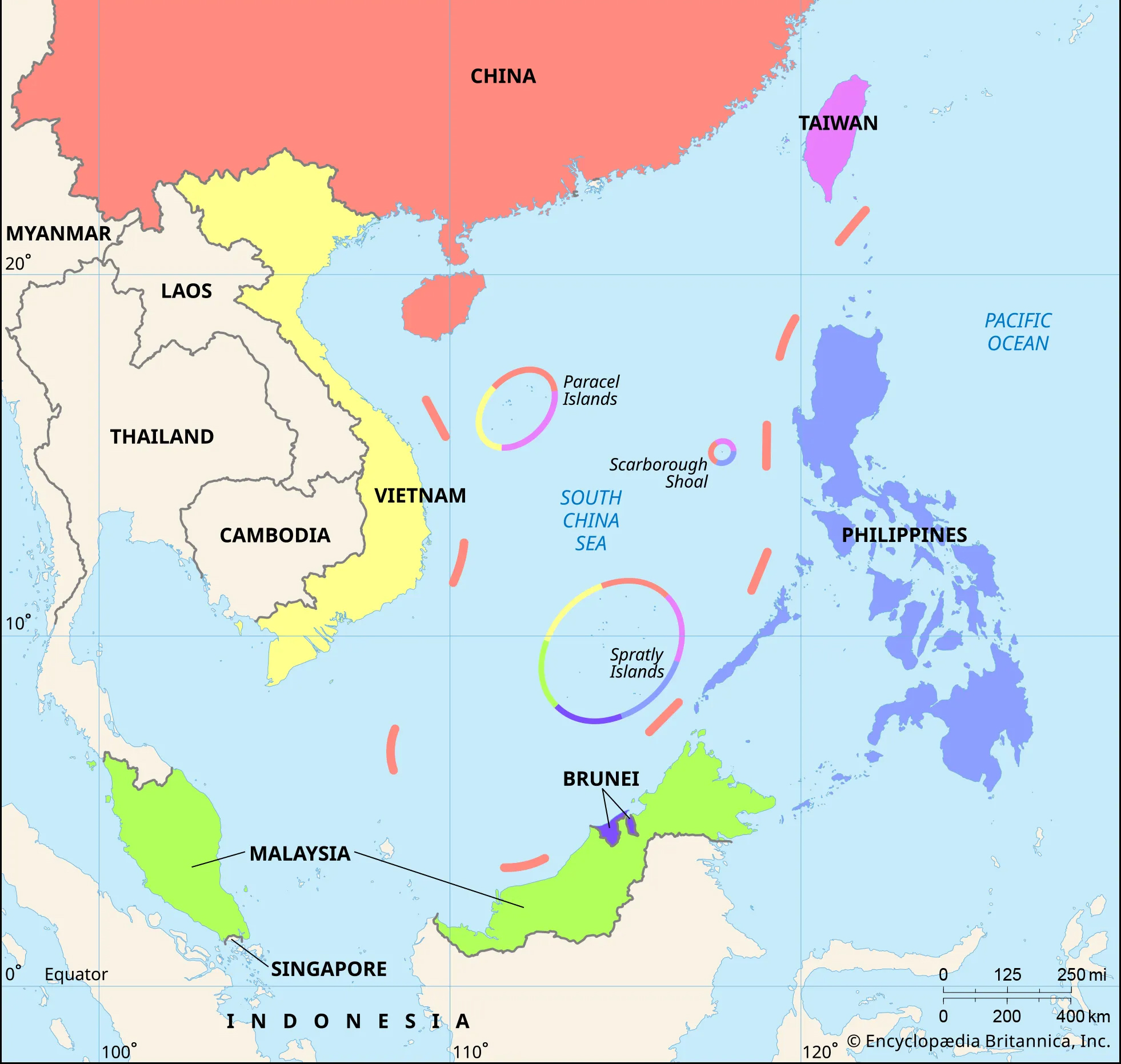Context:
On October 12, 2025, a maritime incident escalated tensions between China and the Philippines in the disputed waters of the South China Sea, specifically near Thitu Island (known as Pag‑asa in the Philippines).
About the issue:
Philippine vessels, including the BRP Datu Pagbuaya were anchored near Thitu Island supporting Filipino fishermen when Chinese coast guard ships reportedly approached.
· Manila accuses Chinese ships of using water cannons and eventually ramming the Philippine vessel’s stern, causing minor damage but no injuries.
· China, for its part, claims the Philippine vessels had “illegally entered” waters near Sandy Cay in the Spratly Islands and that Philippine dangerous manoeuvres led to the collision.
Why This Is Important?
The incident isn’t isolated but part of a pattern of frequent maritime confrontations in the South China Sea, involving overlaps in territorial claims, fisheries access, and assertions of sovereignty. The Spratly Islands (including Thitu Island, Sandy Cay) remain flashpoints among several claimants.
Strengths in the Philippine Position:
-
-
- Clear legal basis: The Philippines invokes its EEZ and also refers to international arbitration (2016 ruling) to reinforce its maritime claims. This gives its protests a stronger grounding in international law.
- International diplomacy: The Philippines has been able to draw attention (including from the U.S.) which helps put diplomatic pressure on China to moderate behaviour.
- Clear legal basis: The Philippines invokes its EEZ and also refers to international arbitration (2016 ruling) to reinforce its maritime claims. This gives its protests a stronger grounding in international law.
-
Challenges for the Philippines:
-
-
- Enforcement limitations: Even when the Philippines has legal justification, its ability to physically enforce its claims (especially in remote maritime zones) is constrained. China has superior coast guard/naval resources.
- Dependence on external support: The Philippines’ ability to sustain diplomatic or defensive pressure often relies on alliances (e.g. U.S., AUKUS‑aligned countries) and regional institutions. Those are subject to broader geopolitical tensions.
- Enforcement limitations: Even when the Philippines has legal justification, its ability to physically enforce its claims (especially in remote maritime zones) is constrained. China has superior coast guard/naval resources.
-
China’s Position
-
-
- Assertion of sovereignty: From China’s view, such operations (using water cannons, coast guard presence) are tools to enforce its claim, deter perceived encroachment, and signal resolve.
- Legal ambiguity & public opinion: China’s expansive maritime claims have been ruled invalid by international arbitration, but Beijing does not recognise that ruling. Instead, China tends to rely on historical claims, “control measures”, and its coast guard rules to justify actions.
- Assertion of sovereignty: From China’s view, such operations (using water cannons, coast guard presence) are tools to enforce its claim, deter perceived encroachment, and signal resolve.
-
Larger Implications
-
-
- Regional stability risks: The South China Sea is a critical maritime route. Ongoing skirmishes threaten to disrupt shipping, fisheries and could draw in countries like the U.S., Australia, Japan, which have interests in freedom of navigation.
- Precedent for maritime law enforcement: China’s coast guard acts increasingly assertively, sometimes under legal cover of new rules. How states respond (and international norms shift) may set precedents for other disputed seas.
- Regional stability risks: The South China Sea is a critical maritime route. Ongoing skirmishes threaten to disrupt shipping, fisheries and could draw in countries like the U.S., Australia, Japan, which have interests in freedom of navigation.
-
Conclusion:
ConclusionThe maritime incident near Thitu Island has further escalated tensions between China and the Philippines in the South China Sea. The competing claims and economic significance of the region make it a critical issue for regional stability and global security. Diplomatic efforts are necessary to resolve the dispute and prevent further escalation. The international community is watching closely, and the situation remains volatile







